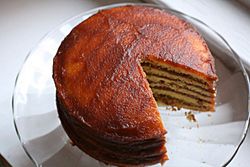Stack cake facts for kids

Apple stack cake
|
|
| Alternative names | Dried apple stack cake, poor man's fruit cake, Confederates old-fashioned stack cake, Appalachian stack cake, Kentucky stack cake, Kentucky's washday cake |
|---|---|
| Type | Cake |
| Place of origin | United States |
| Region or state | Appalachia |
| Main ingredients | Apple preserves, dried apples, or apple butter |
Stack cake, also known as apple stack cake, is a special dessert made of many thin cake layers stacked on top of each other. Sweet fruit filling is spread between each layer. These cakes are often cooked in a cast iron skillet, but they can also be baked in an oven.
The cake batter usually contains molasses, which gives the cake a slightly crispy texture. It's a bit like a thick cookie or a biscuit. The filling is often made from apples, using things like applesauce, apple butter, or apple jelly. Other fruits, such as apricot, date, or raspberry, can also be used for the filling. Stack cake is a very popular dessert in the Appalachia region of the United States.
Contents
The Story Behind Stack Cakes
People have different ideas about where stack cakes came from.
A Special Wedding Cake?
One idea from 1983 suggests that stack cakes were once used as a simpler, less expensive version of a fancy wedding cake. Back then, traditional layered wedding cakes were very costly. The story says that women would each bring a layer of cake to a wedding, and these layers would be stacked together. However, this idea might not be true. Stack cakes usually need at least two days for the apple filling and cake flavors to mix well. If you ate one too soon, it wouldn't taste as good!
From Pennsylvania to Kentucky?
Another idea is that James Harrod brought the stack cake recipe from Pennsylvania to Kentucky. But this cake likely didn't become popular until much later. Flour, a key ingredient, wasn't widely available in the region until over 100 years after Harrod's time. So, there isn't one clear story about how stack cakes began.
What Makes Stack Cakes Special?
There are many different recipes for stack cake layers. Some layers are soft and spongy, while others are more like cookie dough. Sometimes, one stack cake can even have layers made with different recipes and flavors!
Flavors and Fun Gatherings
In the Bluegrass region, some stack cakes are made with a gingerbread-like batter that uses sorghum molasses. Stack cake parties are sometimes held, not just for weddings. These gatherings are a fun way for people to share their favorite recipes and chat. Stack cakes are enjoyed throughout all of Appalachia, not just in Kentucky.
To make the typical seven or eight layers fit, each cake layer was often pressed very flat. Some common flavors added to the cake layers include ginger, apple, and molasses.
 | Victor J. Glover |
 | Yvonne Cagle |
 | Jeanette Epps |
 | Bernard A. Harris Jr. |

